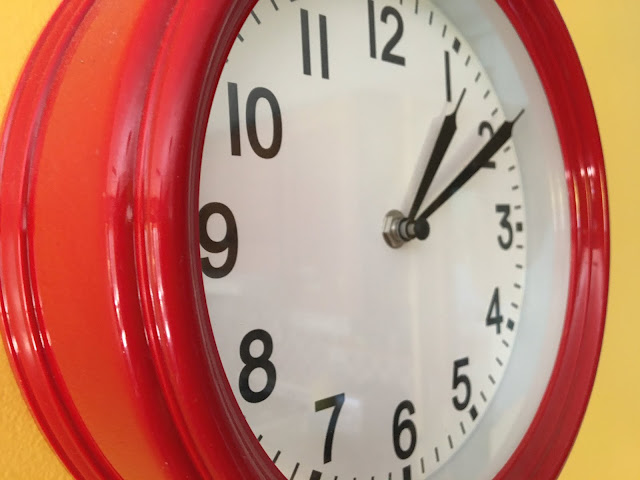I checked out a copy of Laura Vanderkam's book
Off the Clock last week because who could resist the subtitle:
Fell Less Busy While Getting More Done? While it's true that there have been times over the years that I've gotten a lot done, I don't feel like I have any kind of system for it, other than powering through, and I rarely feel not busy, even though I've (mostly) banished the word from my vocabulary and stopped treating business like a virtue. I'm hoping this book will help me take control of my time in a more organized fashion.

The first thing Vanderkam recommends is tracking your time, which makes sense. If you don't know how you spend your time, how will you know how to spend it better?
Coincidentally (or perhaps not coincidentally, since figuring out how to best use my time before I go back to work has been on my mind), I had been kind of half-assedly trying to track my time over the last couple of weeks by writing down my daily activities in a ratty old notebook. The trouble was, I'd get going on a project, rush out of the house to pick up the kids, hurry home to make dinner, and lose all track of where those hours went. With a spreadsheet, I feel obligated to fill in all those gaping boxes. This is how day one looked:
Monday
12:00 a.m. - 7:00 a.m.: Sleep
7:30 Exercise (yoga, walk)
8:00 - 8:45: Cook/ Eat (breakfast) /Read (news)
8:45 - 10:00: Writing
10:00: Clean/Organize (tidy kitchen)/ Shower/ Dress
10:30 - 11:30: Blog
11:30 - 12:00: Email
12:00 - 1:00: Cook/Eat (lunch)/Read (Orion)
1:00 - 3:00: Volunteer (Literary Mama; finalize Nov. essay)
3:00 - 3:30: Exercise (balance board)
3:30 - 4:30: Clean/Organize (tidy kitchen; organize desk drawer)
4:30 - 4:45: Volunteer (MMNP; prep for conf. call)
4:45 - 6:00: Cook / Eat (dinner)
6:00 - 7:15: Volunteer (MMNP; conf call)
7:15 - 7:45: Clean/Organize (sort & fold laundry)
7:45 - 8:00: Art (watercolor)/ Social Media (Instagram)
8:00 - 9:00: Entertainment (TV)/ Craft (knitting)
9:00 - 10:00: Read (fiction)
10:00 -12:00 Sleep
For a total in each category of:
| Sleep | 9 |
| Exercise | 1 |
| Read | 2 |
| Write | 2.5 |
| Volunteer | 3.5 |
| Cook/Eat | 2.25 |
| Clean/Organize | 2 |
| Entertainment | 1 |
| Art | 0.5 |
| Craft | 1 |
| Self-care | 0.25 |
| Total | 25 |
Yesterday was a little unusual in that it rained all day, so I didn't go outside except for that one short walk in the morning. E and Z also didn't have cross-country practice, so I didn't have to pick them up. That freed up an hour, which I might otherwise have spent reading or knitting (or going outside, if it weren't raining), but which I put to use cleaning up the kitchen and my desk drawer, in part because I'd yanked the drawer out in frustration and put it in the middle of the floor earlier in the day, and in part because C was home early, and it's difficult to sit and relax when other people are around, potentially judging you. I also listened to writing podcasts while I exercised and cleaned, which I could count as professional development. Also, because I knit while I was watching TV, there's an extra hour in there. I realize there's a bit of the observer effect going on here—that is the act of observing my behavior is affecting that behavior, but since this is a project in figuring out how to better spend my time, not a research study, that's all to the good.
If I think about my realistic ideal day (another Vanderkam concept), I see that a lot of the elements I'd want it to contain are here: writing, reading, art-making, crafting. I'd like to take more time for going outside and spending time in nature (maybe I should have grabbed my umbrella and rain boots and walked in the rain) and for self-care, which I'm terrible at (I can't even think of anything good other than a bubble bath). I'd also wish for more positive, active family engagement, but that's tough with two teenagers who have a lot of homework and who want to spend their non-homework time doint their own thing. But the first step is awareness. I'll be back next Tuesday with the results of week one.
This is all pretty borning compared to the
Daily Schedule I posted ten years ago on this blog, an amusing, and slightly terrifying, glimpse into life with small children. Looking at it now, I wonder how I survived one day let alone years of it. It makes any time management challenges I might face now (even when I get back to working 10 or more hours per day) seem downright quaint.
 But I can write about the good things that happened on a particular day; because those events are in the past, no gremils can take them away. My sister-in-law gave me this little "favorite moment a day" journal for Christmas last year (or the year before??), and I'm sorry to say I've been very lax in using it. But I've just started to put it into practice and intend to keep it going, even (especially) once I return to work.
But I can write about the good things that happened on a particular day; because those events are in the past, no gremils can take them away. My sister-in-law gave me this little "favorite moment a day" journal for Christmas last year (or the year before??), and I'm sorry to say I've been very lax in using it. But I've just started to put it into practice and intend to keep it going, even (especially) once I return to work.





